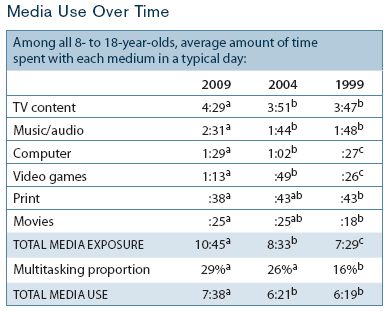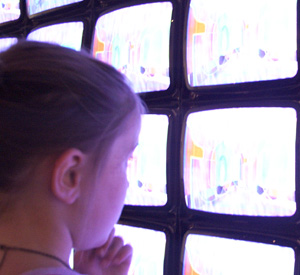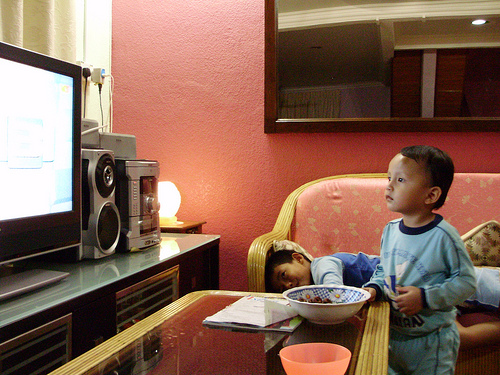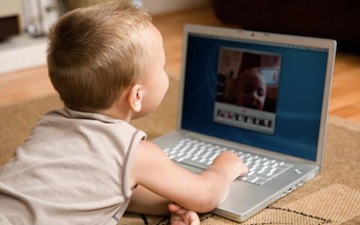Search results
130 results found.
Influences of Media & Pop Culture on Our Worldview.
130 results found.
Kaiser Family Foundation released their most recent media usage study. Six years ago they found the usage of 8 to 18 year old was about 6 hours and 21 minutes of media consumption a day. This recent study shows that the media consumption rate has risen to 7 hours and 38 minutes. That is almost as much time as adults spend at work except remember that adults only work 5 days a week.

The amount of media consumed by children has always been a point of concern as media has been found to have great affects in molding a child’s view of the world. It has become all the more important that parents watch over what their children are consuming and what kind of message they are taking in.
Some things parents can do are to regulate what kind and what type of media their children consume. Another is to watch what your kids are watching together so you can explain how best to process the message it portrays. Another is to ensure internet safety for kids with tools that can supervise online activities.
With the proliferation of online media, increased video sharing, and mobile media – these numbers are shocking, yet they are not a surprise.
For the first time, Traditional TV consumption actually fell as other mediums such as video games, music, online media and movie watching has increased. What is even more wild is that kids are often watching multiple forms of media at once. The actual consumption of media was found to be closer to 10 hours and 45 minutes.

“The advertising and marketing industry spends over $17 billion a year on shaping our children’s identities and desires.”
Below is an excellent article discussing the influence of media and money in “commodifying” of children in our modern culture. The article itself is very long so I’ve excerpted pieces of it below with a link at the bottom to the original source. Enjoy!
As we face difficult economic times, everyone is wondering how are we going to bounce back? What can be done? In all the pain and sufferings we are facing, perhaps we should stop and ask ourselves, is there something we can learn from all this? Is there something we could change? The article asks “What kind of society and future do we want for our children given how obviously unsustainable and exploitative the now failed market-driven system has proven to be?”
In a society that measures its success and failure solely through the economic lens of the Gross National Product (GNP), it becomes difficult to define youth outside of market principles determined largely by criteria such as the rate of market growth and the accumulation of capital. The value and worth of young people in this discourse are largely determined through the bottom-line cost-benefit categories of income, expenses, assets and liabilities. The GNP does not measure justice, integrity, courage, compassion, wisdom and learning, among other values vital to the interests and health of a democratic society.
“Subject to an advertising and marketing industry that spends over $17 billion a year on shaping children’s identities and desires, American youth are commercially carpet-bombed through a never-ending proliferation of market strategies that colonize their consciousness and daily lives.”
Children once was perceived as important social investments, innocent children we needed to protect as they would one day be the moral foundations of our society. Our culture protected them. Businesses wouldn’t dare objectify them or treat them like any other commodity. Yet time has changed dramatically in the last couple decades. It has moved from a culture of social protection to a culture of commodification. Now children from a young tender age, grow up in a culture that objectifies their value taking away any sense of moral agency.

Every single day millions of children are constantly bombarded by media. Television, Internet, Movies, Video Games, Music, Videos are some of the many forms of media that continues to feed particular messages and ideas into our children and ultimately into our culture.
Dr. Douglas A. Gentile, a developmental psychologist and assistant professor in Iowa State University’s Department of Psychology, offered an explanation.
With the 21st century offering a greater number of media than any other period in history, younger generations can view or listen to almost any sort of content at the touch of a button.
“I think that alone makes the fair question, ‘Might it have a different effect than we’ve ever seen before in human history?'” Gentile said.
Gentile would go on to discuss how our concepts of normal behavior, our values, sense what is acceptable and unacceptable develops from our “spheres of influence”. First from Family, then community and the rest of society.
“The media influence us not just one-on-one when we watch them. They also influence us by influencing our families. They also influence us by influencing our communities. That’s one of the reasons it’s hard to tell if you’ve ever been affected because it’s not just a simple one-to-one relationship. You’re being influenced in multiple directions all at the same time,” Gentile said.
Below is a video depicting the influence of parents and adults on their children. It is always amazing how much children are fully aware of what goes on around them and pick up on subtle cues and actions.
Though this video does not necessarily talk about media’s impact on children or our culture, it does highlight (though the form of media) that rather than simply blaming media for everything that has gone wrong, we as a whole need to take personal ownership over how our actions and behavior impact those around us especially the children.
Watch the video and read on below!
Does Media have an impact on our children? This question is no longer a question but something validated through numerous studies over time. Yet why is it that most families continue to allow our children and teens to sit hours on end in front of a TV screen or bother to read up on or screen movies before allowing them to watch? Is it because of the convenience of using the TV as the ultimate babysitter? Is it because we don’t bother to really think about it and assume it our children and teens would know the difference of what is right and wrong? Is it because we have gotten used to the violence and sexual imagery used in almost every single TV show and Movie? Every single one of these points are probably true. We all know how much media affects us, how much more for the internet generation where every piece of media is only a click away?
I had such a fellow in my kindergarten who was very sensitive to television watching. In his play he always identified enemies, be they sharks, monsters or other children, and fortified himself and attacked them. Gradually, as TV was minimized in his life, (unfortunately it was never eliminated), his play became more social and less aggressive. However, several times during the year he visited his grandparents for a week at a time, where the TV was on most of the time. He came back in full attack mode. At such times he would push children down on the playground, and he would say to me, “They were going to hurt me,”

Youtube announced this week that they will no longer allow videos that target children that include certain disturbing content. For years, youtube had been criticized for allowing disturbing content targeting children to be circulated.
The policy notes describe disturbing content as “… that contains mature or violent themes that explicitly targets younger minors and families in the title, description and/or tags will no longer be allowed on the platform…”
You can read more: Youtube bans disturbing kid videos
 1 out of 40 Deal with Underage Identity Theft
1 out of 40 Deal with Underage Identity TheftIdentity theft is an ever-growing problem as generations grow up with the Internet at their side. This isn’t a crime that only happens to adults, as the Identity Theft Assistance Center reports 1 out of 40 households deal with identity theft of underage members. Thieves target minors for social security numbers not already used to obtain credit and jobs. The Parent Teachers Association and LifeLock have teamed up to help parents and children understand online dangers and how to avoid them so they stay safe.
The PTA and LifeLock are creating interactive tools and learning kits to present the dangers of identity theft and online activity in a kid-friendly way throughout 2014. The goal is to have engaging tools that teach children to stay safe during online activities. The program also teaches the specific dangers to keep in mind when they use the Internet. The tools target several audiences during the tools development process, with some kits designed to help parents thoroughly explain the issues to their kids, and others designed for classroom use.
First consider an Internet Filter or Monitoring program such as CovenantEyes for your children. It will not only help you keep tabs on what kind of websites they visit, but will allow you to filter dangerous or inappropriate website as well as monitor how often your child is on the internet.
SEE: CovenantEyes Review
Teach your children to only enter personal information on secured Web forms for approved services and websites. Make sure they know “https:” indicates secure webpages, as do common security seals such as McAfee Secure. Point out red flags in phishing emails that mimic a login page of a legitimate service. Often the phishing emails have bad spelling or grammar, use a website address that is close to, but not exactly, the legitimate URL, or send you to a different URL than the link’s anchor text. When your child discovers a phishing email, send it to the company it’s spoofing so they shut down the scammer.
Use anti-virus software that includes email and Web protection as part of the package. A typical anti-virus program only scans the files on your computer. Instead, use an anti-virus application that also checks email and websites to protect your children against phishing, malware, and trojans. The scheduling function ensures that your computer gets a full scan every day without fail, helping to minimize potential damage caused by a virus that got through the active protection.
Configure Windows Firewall or a third party firewall software to select which installed programs are permitted to access the Internet. Whitelist programs like Windows or iOS, your anti-virus software, and trusted online games. A whitelisted program always has firewall permission to connect to the Internet, while you get prompted by the firewall to allow other programs access on a case by case basis.
Social networks such as Facebook provide a range of tools to fine tune privacy settings on profiles, statuses, and other content shared on the website. Only allow your children’s Facebook friends or a custom list of friends to see their status updates, pictures, and other social network content. In addition, Facebook allows you to control who sees personal information on a profile, such as phone numbers, email addresses, and physical addresses.
What are our kids learning from television? The Federal Communications Commission says children currently spend more than three hours a day watching television. Although the FCC has enacted provisions that require broadcasters to improve and increase the educational content of children’s television, there is no consistent way to ensure that what children watch has any redeeming qualities.

flickr image by Jerine Lay
Children’s television, by and large, neglects education and jumps right to banal programming. Although “Spongebob” is entertaining, there isn’t a lot of educational value in watching Mr. Crabs or Patrick wade their way through thirty minutes of silliness. Of course, “Spongebob” is just one of dozens of examples of children’s television that is simply there for entertainment and not to teach children lessons.
There is even less family-friendly programming during traditional family viewing times in the evening after dinner. There are reality television shows in which people run around half dressed, sex is implied if not practically explicit, and there are comedies that might be funny for adults, but are inappropriate for kids.
Amazon is combating the current state of children’s television by attempting to create shows that will also be educational. The company is developing “Sara Solves It,” a show in which two friends, Sara and Sam solve math-based mysteries each episode. In some ways, this may be a 30 minute episode reminiscent of Electric Company and other similar television programs. “Creative Galaxy,” described as an interactive art adventure series, is another program Amazon is developing.
Parents who are interested in finding quality programming for their children will be able to vote with their pocketbooks to determine whether more programs and episodes will be made. The won’t be at the mercy of networks and their advertisers, forced to watch what is already on television. Parents can order these programs directly into their homes and watch them with their children any time they like.
Netflix is producing a TV adaptation of the upcoming Dreamworks children’s movie “Turbo.” The show, called “Turbo F.A.S.T.” is about a snail who dreams of being a racer and the glory that would come from it. Then, through an accident, he is able to achieve his dream.
Streaming services are significantly less expensive than cable packages, though more limited in many ways. But if you don’t watch very much TV and are comfortable with content options of Amazon or Netflix, you can get them for as little as $8 a month, compared to approximately $30 a month for a bare-bones cable package, notes Direct2TV.
If children are going to watch television for hours a day, it looks like they will have plenty of educational options moving forward.
A refresh of Socialnomic’s Social Media Revolution video is out. The numbers are staggering and continue grow in a phenomenal pace. Whether this incredible social media growth good for our world or bad is hard to tell. Last time we left off Social Media was consuming 1 out of every 6 minutes… now?
Social Media Revolution Video 2009
Social Media Revolution Video 2010
[poll id=”24″]
News is spreading.
Facebook is considering allowing children under the age of 13 to have accounts on Facebook.
The question would had to have come sooner or later as means for continual Facebook growth. Previously anyone under the age of 13 were not allowed to have accounts, though a Consumer Report study estimated that out of 20 million minors on Facebook, 7.5 million of these children were younger than 13. Among these users, 5 million were 10 years or younger and were not being supervised by their parents. Age restrictions have always been difficult on the internet.
This is not a simple matter of whether to let kids have access or not. Keep in mind, part of the reasoning in keeping young children on Facebook is the incredible dangers that it poses.
There are the obvious factors most people would know, such as the presence of sexual predators, and creepy people talking to kids. Also one million kids were harassed, threatened, or cyberbullied on the past in the last year (Consumer Reports). There has been numerous studies on how the internet and social media cause anti-social behaviors in hyper-connected children. We here at Clean Cut Media even posted an infographic about how the internet is ruining your brain! But even more than these obvious issues, there are many other dangers not as well known. For example:
Photo Accessibility: Photos posted on Facebook or the internet in general can easily spread very quickly. As they say once it’s on the internet, it’s there forever, even if you delete them. Even if you were careful, it can easily be grabbed by someone and posted elsewhere. There are many instances were lives were ruined because of some poor Facebook photo going viral. This is not only for photos you upload, but photos your friends may upload or you upload of your friends. Many lives are ruined because of one photo uploaded by someone who didn’t think through the consequences.
Abuse of Knowledge: Another example many do not consider is how sites like Facebook are used for theft and burglary. Did you just say you and your family are going on a awesome 3 month vacation to Europe? You just announced your home will be vacant for 3 months. It’s scary to think about, but consider how else more dangerous people can utilize such information.
Inappropriate Content: How about dangerous and inappropriate links shared by friends, strangers, malware or clicked on by accident as they surfed the web?
Is your daughter posting pictures of themselves all over the net? Who can access those? Download those?
Some may argue that the children are already on it anyway and more should be done to help allow parents to monitor. Is that Facebook’s responsibility to provide the tools to do so or does it mostly lie on the parent? How about the idea that Facebook create a separate sub-site for those under 13 with strict monitoring tools and filters as well as an easy way to transition the account to the main facebook platform? Food for thought. Share your ideas!
So Question:
[poll id=”34″]
The Muppets have always been grown-up versions of the “Sesame Street” characters. If you were a little kid in the late 1970s, you probably have fond memories of watching their variety show. I watched it with my grandfather, listening to him chuckle over the antics of Kermit, Fozzie and the rest.
Fast-forward 30 years and a handful of theatrical films later. Most kids know Elmo, but how meaningful is a visit back to Muppet Studios?
“The Muppets,” the latest film excursion for this band of felt characters, catches us up years after Muppet fame has peaked — and crashed. Human character Gary (Jason Segel) is best friends with Walter, who happens to be a puppet. Since childhood, Walter has dreamed of being a real Muppet, so when the friends have a chance to visit Muppet Studios, they jump on it — and are horrified to discover that the studio is run-down and the Muppets disbanded. Tex Richman, an “evil oil baron,” plans to raze the studio. From there, the friends (along with Gary’s long-time girlfriend Mary, played by Amy Adams), scheme to get the gang back together, put on a show and raise money to get the studio back and make the Muppets famous again.
But that’s like saying that Pixar’s “Up” is about a boy rescuing a bird from a hunter.
Yes, the film is hilariously funny. Fans of “The Muppet Movie” will recognize the self-referential moments, such as Kermit being introduced with a chorus of angelic singing, only to have a church choir bus drive by. Or when the road trip to gather the remaining Muppets takes too long, and the little group agrees to “pick up the rest by montage.”
But it’s serious, too. Emotionally, the movie aims for a level of sophistication that’s above the average 6-year-old. The puppet characters are filled with regrets. A scene where Kermit and Miss Piggy discussed how they disappointed each other could have just as easily played out with, say, Johnny Depp and Penelope Cruz.
Time has passed since their hey-day, and we’re asked if the Muppets were left behind. Tex tells them, “You’re relics, Muppets. The world has moved on, and no one cares about your goody-goody, hippy-dippy Julie Andrews and Dom DeLuise hostin’, singin’-and-dancin’ act anymore. You’re dead!” For those who wouldn’t recognize Dom DeLuise, sadly, that may be true.
So, should you even try to get your little ones to watch? If you want to share the Muppets with your kids, it’s sure worth a try — it’s a kid-safe experience. The language is squeaky-clean. I’ve heard some take offense at the “evil oilman,” but along with the soundtrack, Tex is a throwback to the 1980s. Gary and Mary share a hotel room on their vacation, though the twin beds are obvious and their relationship is almost painfully wholesome.
“The Muppets” is a great film for older kids who like sllly humor (and who doesn’t?) and may be able to grasp how friends can get left behind. Be warned, though — it packs a surprising emotional punch. If you were embarrassed when your daughter or son caught you crying at the beginning of “Up,” you might want to prepare yourself. At least on home video, you can slip out of the room for a moment.
Clean Cut Media’s Take
I haven’t seen it, but I have heard good reviews about this movie. Though the note above about Gary & Mary sharing a hotel room bothers me. If it’s a kids movie, why not just have them be in different rooms? However, considering how unclean so many movies are these days, it is refreshing to see a movie that seems to pass all the filters with flying colors.
- Have you seen the movie?
- Let us know your thoughts!
About Guest Author
Jennifer Rose Hale is a freelance writer and web producer at an education nonprofit that offers online education opportunities and discussion for a variety of age groups.
 Did you know a lot of employees of leading high-tech firms in the silicon valley such as Apple, Google, Yahoo, and Hewlett-Packard send their children to a computer-free school?
Did you know a lot of employees of leading high-tech firms in the silicon valley such as Apple, Google, Yahoo, and Hewlett-Packard send their children to a computer-free school?
Schools nationwide have rushed to supply their classrooms with computers, and many policy makers say it is foolish to do otherwise. But the contrarian point of view can be found at the epicenter of the tech economy, where some parents and educators have a message: computers and schools don’t mix. – NY Times
So then comes the questions:
A recent survey released by Pew Internet Projects asked technology experts about this issue. The question: Will Millennials benefit or suffer due to their hyperconnected lives?
 In this survey, technology experts and stakeholders were fairly split in their opinions about whether highly connected people will end up having a positive or negative impact by 2020. The feeling is that young people who grow up hyper-connected via the internet, mobile web, and the internet will reap the benefit of being more nimble and quick-acting multitaskers. However on the other end, the same experts expect that those growing up fully connected will increase in their need for instant gratification, settling for quick choices, lacking patience, and the loss of social skills. Many expressed concerns of these trends, some mentioning George Orwell’s 1984 as well as fears of control by powerful interests in an age where distractions and quick entertainments rule.
In this survey, technology experts and stakeholders were fairly split in their opinions about whether highly connected people will end up having a positive or negative impact by 2020. The feeling is that young people who grow up hyper-connected via the internet, mobile web, and the internet will reap the benefit of being more nimble and quick-acting multitaskers. However on the other end, the same experts expect that those growing up fully connected will increase in their need for instant gratification, settling for quick choices, lacking patience, and the loss of social skills. Many expressed concerns of these trends, some mentioning George Orwell’s 1984 as well as fears of control by powerful interests in an age where distractions and quick entertainments rule.
Anyone remember this haunting quote?
” [it’s] easier [online] to be who you want to be, because nobody knows you and if you don’t like the situation you can just exit and it is over. ” – Clean Cut Media
[poll id=”24″]
The respondents were encouraged to pick one of two stances. 3% did not respond.
55% agreed with this statement:
In 2020 the brains of multitasking teens and young adults are “wired” differently from those over age 35 and overall it yields helpful results. They do not suffer notable cognitive shortcomings as they multitask and cycle quickly through personal and work related tasks. Rather, they are learning more and they are more adept at finding answers to deep questions, in part because they can search effectively and access collective intelligence via the internet. In sum, the changes in learning behavior and cognition among the young generally produce positive outcomes.
 42% agreed with the opposite statement:
42% agreed with the opposite statement:
In 2020, the brains of multitasking teens and young adults are “wired” differently from those over age 35 and overall it yields baleful results. They do not retain information; they spend most of their energy sharing short social messages, being entertained, and being distracted away from deep engagement with people and knowledge. They lack deep thinking capabilities; they lack face to face social skills; they depend in unhealthy ways on the internet and mobile devices to function. In sum, the changes in behavior and cognition among the young are generally negative outcomes.
Hyperconnected basically means, you are always connected, a finger tip away. It is a word describing an environment where people are linked continuously through some kind of technology to other people and information.
Another survey from Pew Internet Projects show that 95% of teens ages 12-17 are online, 76% use social networking sites, and 77% have cell phones. Those in ages 18-29? 96% use the internet, 84% use social networking sites and 97% have cell phones. Over half of them use smartphones and 1 out of 4 own tablet computers like the iPad.
[poll id=”7″]
So the same question remains.